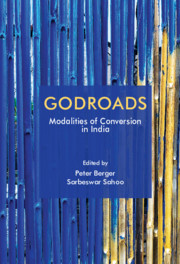Book contents
- Frontmatter
- Contents
- Foreword
- Acknowledgements
- Introduction
- 1 The Rise, Growth and Significance of Shudra Conversion Movements in the Methodist Mission, Hyderabad, 1925–1947
- 2 Communism and the Cross: A Caste–Class Trajectory of Religious Conversion in South India
- 3 Religious Conversion as Ethical Transformation: A Study of Islamic Reformism in Rural West Bengal
- 4 Conversion versus Unity: The Basel Mission among the Badaga on the Nilgiri Plateau, 1845–1915
- 5 Identity Change and the Construction of Difference: Colonial and Postcolonial Conversions among the Sumi Naga of Nagaland, Northeast India
- 6 Conversion to Christianity and Healing: The Naga of Northeast India
- 7 Reshaping the American Evangelical Conversion Narrative in Nineteenth-Century North India
- 8 Cultural Transformations through Performance Arts in Early Twentieth-Century South India
- 9 Reservation and Religious Freedom: Understanding Conversion and Hindu–Christian Conflict in Odisha and Rajasthan
- 10 Rupture and Resilience: Dynamics between a Hindu Reform Movement and an Indigenous Religion in Highland Odisha
- Afterword: India Seen from Amazonia
- About the Contributors
- Index
8 - Cultural Transformations through Performance Arts in Early Twentieth-Century South India
Published online by Cambridge University Press: 24 April 2020
- Frontmatter
- Contents
- Foreword
- Acknowledgements
- Introduction
- 1 The Rise, Growth and Significance of Shudra Conversion Movements in the Methodist Mission, Hyderabad, 1925–1947
- 2 Communism and the Cross: A Caste–Class Trajectory of Religious Conversion in South India
- 3 Religious Conversion as Ethical Transformation: A Study of Islamic Reformism in Rural West Bengal
- 4 Conversion versus Unity: The Basel Mission among the Badaga on the Nilgiri Plateau, 1845–1915
- 5 Identity Change and the Construction of Difference: Colonial and Postcolonial Conversions among the Sumi Naga of Nagaland, Northeast India
- 6 Conversion to Christianity and Healing: The Naga of Northeast India
- 7 Reshaping the American Evangelical Conversion Narrative in Nineteenth-Century North India
- 8 Cultural Transformations through Performance Arts in Early Twentieth-Century South India
- 9 Reservation and Religious Freedom: Understanding Conversion and Hindu–Christian Conflict in Odisha and Rajasthan
- 10 Rupture and Resilience: Dynamics between a Hindu Reform Movement and an Indigenous Religion in Highland Odisha
- Afterword: India Seen from Amazonia
- About the Contributors
- Index
Summary
The anti-colonial movements and nationalist discourses of the early twentieth century India are much researched topics. Within the context of nationalism, scholars have shown how the construction of Hinduism as a unifying identity marker functioned as an ideology which contributed to a religion-based identity politics that intertwined with nationalism during these movements (King 1999; 2010; Oddie 2006; 2010; Sugirtharajah 2010). These discourses, as Chatterjee (1993) and others have shown, involved appropriation of colonial (including the missionary) discourses on gender, religion and linguistics. In this chapter, I focus on the historical developments in south India and its nationalistic politics during the early twentieth century. Here, performance arts (mainly music and dance) served as tools to construct newer understandings of national identity as Hindu identity, Indian culture as Hindu culture and Indian subject-hood as Hindu subject-hood as part of a cultural transformation to change the nation into a sacralised land. The colonial city of Madras (now Chennai) served as the centre for these developments. The rhetoric surrounding these developments was that of a nostalgia for a historical (mythical, utopic) Hindu nation, and the efforts to reclaim what was seen as a past/lost glory through sacralisation of performance arts and aesthetic preferences. What the south Indian nationalists hailed as the ‘renaissance’ in colonial Madras (Iyer 1931), performance arts and aesthetic preferences became intertwined with religious identity, specifically Hindu identity, and Indian culture.
That contemporary south Indian classical performance arts are a gendered historical construction of south Indian nationalists has been explored by scholars (Meduri 1996; Allen 1997; 1998; Subramanian 1999; 2006; Weidman 2006; Soneji 2012). Also, it is now well known that the nationalistic discourses, in the Indian National Congress (INC), which was dominant in north India, and in south India were gendered too (Chatterjee 1993; Meduri 1996; Ray 2000; Weidman 2006; Chakrabarty 2007). However, my interest lies in understanding how sacralising performance arts was used as a tool to sacralise the nation, and sacralising aesthetic preferences was used as a tool to sacralise the pan-Indian identity that was also gendered. A question that arises here is: can this be considered as a process of conversion? In line with the other contributions to this volume, this chapter uses a broader definition of the term ‘conversion’.
- Type
- Chapter
- Information
- GodroadsModalities of Conversion in India, pp. 199 - 221Publisher: Cambridge University PressPrint publication year: 2020



